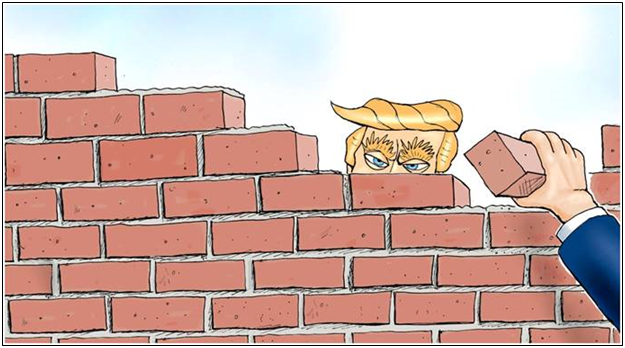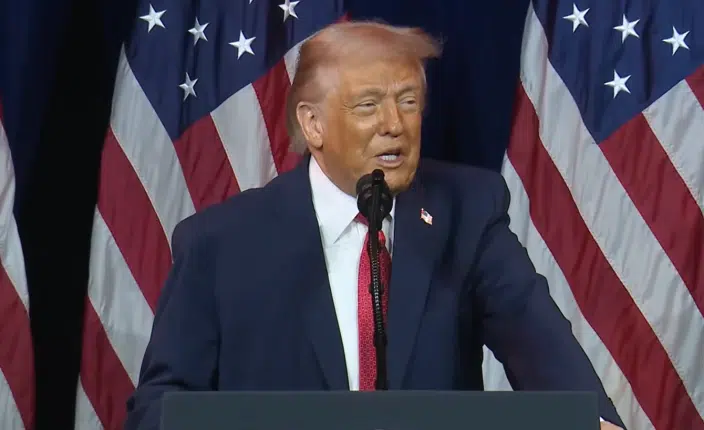“VETO!”
That was President Donald Trump’s one-word response on Twitter to the Senate after it passed a resolution to overturn his national emergency declaration on the southern border. The resolution passed 59 to 41, with 12 Senate Republicans voting in favor.
That was enough to pass the Senate, but 59 votes is not enough to override a veto. That takes two-thirds majorities in both chambers of Congress: 67 votes in the Senate, plus another 290 in the House. And it seems doubtful there will be the votes in either chamber to do so.
In February, House Minority Leader Kevin McCarthy (R-Calif.) dismissed the idea that the veto would be overridden with the help of House Republicans, saying, “I don’t see any way that would get overridden, if it were vetoed, in any way shape or form.”
Similarly, House Minority Whip Steve Scalise (R-La.) declared, “there will be nowhere near the votes to override a veto.”
Meaning, in all likelihood, the veto will stand. That’s that.
In Trump’s emergency declaration, he reprogrammed $8.1 billion of uncommitted military construction funds to building the wall and steel barriers along the southern border. It includes: “About $601 million from the Treasury Forfeiture Fund… Up to $2.5 billion under the Department of Defense funds transferred for Support for Counterdrug Activities (Title 10 United States Code, section 284)… Up to $3.6 billion reallocated from Department of Defense military construction projects under the President’s declaration of a national emergency (Title 10 United States Code, section 2808)…”
That will come atop Congress’ prior approval of $1.6 billion in 2018 for replacing existing fencing with new steel barriers and another $1.375 billion in 2019 for some new steel barriers Trump managed to get after the longest partial government shutdown in history.
That was more than Trump was going to get for the wall without doing the shutdown, but still far less than he needed in order to get the job done. With no other options, he invoked pre-existing limited authority granted by Congress, including 10 U.S. Code § 2808(a), which allows uncommitted monies to be redirected in the event of a national emergency.
It states, “In the event of a declaration of war or the declaration by the President of a national emergency in accordance with the National Emergencies Act (50 U.S.C. 1601 et seq.) that requires use of the armed forces, the Secretary of Defense, without regard to any other provision of law, may undertake military construction projects, and may authorize the Secretaries of the military departments to undertake military construction projects, not otherwise authorized by law that are necessary to support such use of the armed forces. Such projects may be undertaken only within the total amount of funds that have been appropriated for military construction, including funds appropriated for family housing, that have not been obligated.”
So, Senators’ posturing aside, the question is not whether Congress granted the fiscal reprograming authority when the President determines there is an emergency. It did 37 years ago in the 1982 Military Construction Codification Act, which expanded some of the authorities from the National Emergencies Act.
National emergencies have been declared more than 50 times in the past 43 years, but this is the first time Congress has ever attempted to overturn one.
As Americans for Limited Government President Rick Manning noted in a statement, the fiscal reprogramming authority the President is invoking is similar to other authorities Congress grants: “[It] is no different than Congress’ authority to appropriate huge sums of money for broad purposes, leaving it to departments and agencies to determine how best to meet those goals via the contracting process. It is no different than the limited transfer authority Congress grants agencies every fiscal year.”
Manning added, “To pretend that this bit of discretion is different from all the other discretions it has granted is disingenuous at best.”
Indeed. Congress has not acted to repeal these authorities, or it would have done so long ago. The fact that Congress refuses to secure this country by adequately protecting the border pretty much creates the emergency and humanitarian crisis on the border, as drugs, gangs and human trafficking continues to press in. What’s different now is there is finally a president who is doing something about it.
Fortunately, Congressional Republicans have an opportunity to redeem themselves and get the wall built, by voting to sustain Trump’s veto. Now’s the time to fight.
Robert Romano is the Vice President of Public Policy at Americans for Limited Government.







